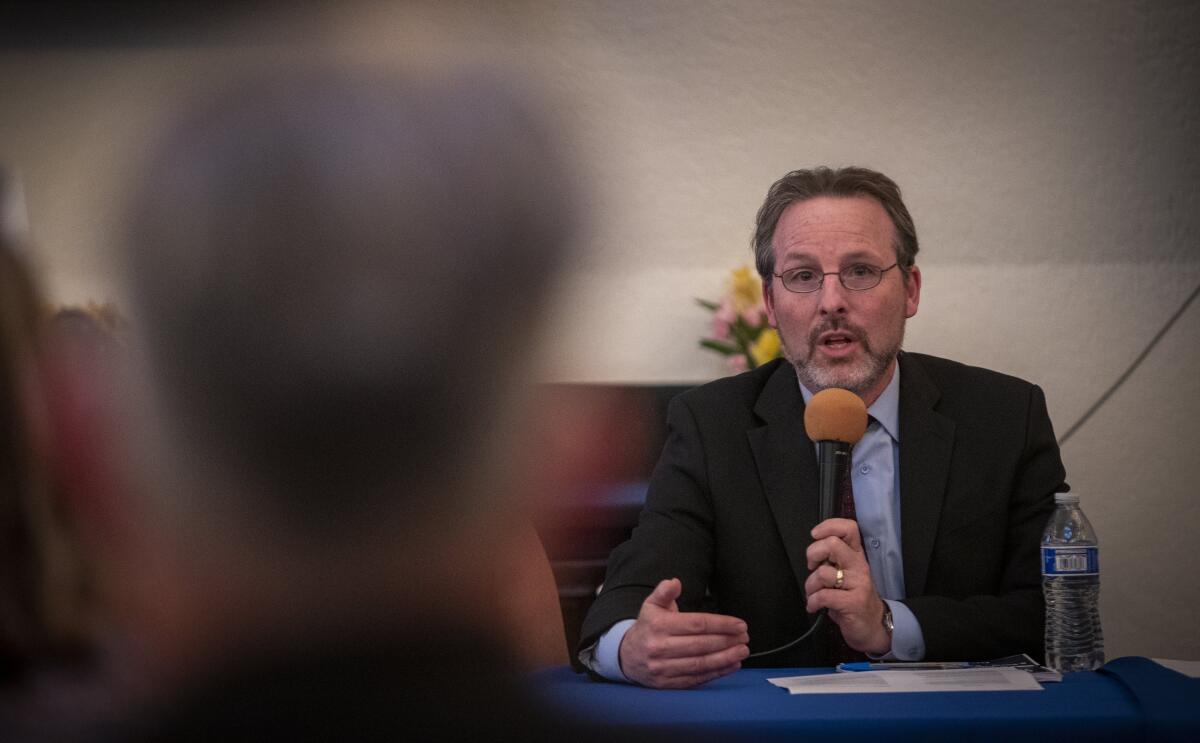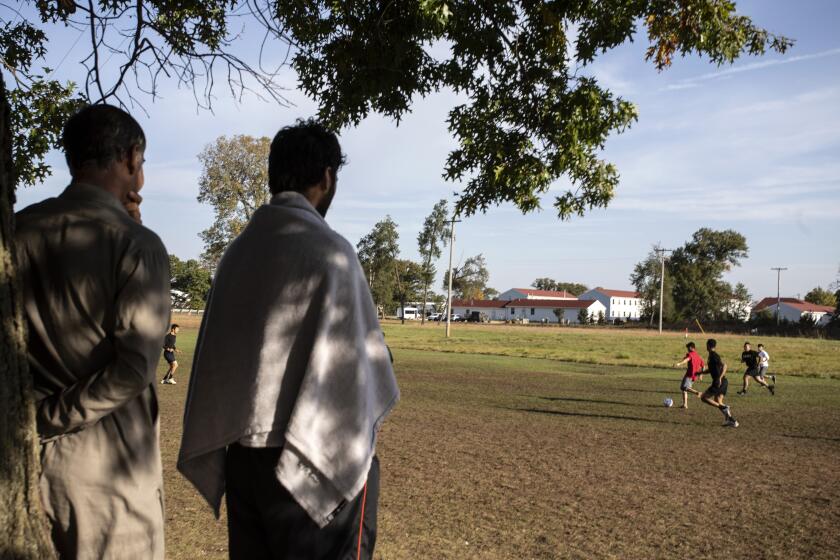O.C. judge facing allegations of withholding evidence and other misconduct

When Judge Kimberly Menninger endorsed Michael Murray’s campaign for judge in 2016, several of his alleged indiscretions as an Orange County prosecutor had already been brought to light, according to a recent legal motion.
According to the motion filed by Assistant Public Defender Scott Sanders, Menninger could have a bias toward Murray — a current O.C. judge — because she supported him despite Murray’s admittance during the much-publicized Scott Dekraai hearings in 2014 that he withheld evidence from three defendants who were sentenced to death and a 2007 court of appeal opinion that cited multiple instances of misconduct from Murray.
Sanders requested in his motion that Menninger recuse herself in the case of David Valladares, who pleaded guilty to second-degree murder in 2005 but whose case, because of a change in the law, is back for a hearing to determine whether there is sufficient evidence for the conviction to remain. Murray was assigned to Valladares’ case when he was working in the district attorney’s office. Sanders doubts Menninger’s ability to remain impartial on the case.
“That doubt stems first from the fact that, unless recused from this matter, Judge Menninger will be required to decide whether to permit [Valladares] to call a fellow member of the Orange County Superior Court’s bench as a witness at a recusal hearing and at the evidentiary hearing, and whether to make adverse findings about that fellow bench officer,” the motion says.
Yet, Menninger denied Sanders’ recusal request late last week, claiming there is no reason to believe that Murray will be called as a witness on the case.
“That [Valladares’] counsel may make a motion in the future in which Judge Murray may be called as a witness forms no basis for the court’s disqualification at this time,” her March 25 court filing reads.
This comes as Murray faces charges from the state’s Commission on Judicial Performance that he allegedly hid evidence when he worked as a prosecutor in the vehicular murder case of Cole Wilkins, who was driving a truckload of stolen appliances in 2006 when a stove fell from his vehicle, resulting in a crash that killed a Los Angeles County sheriff’s deputy. He was convicted of second-degree murder in 2017 and was serving a sentence of 16 years to life in Avenal State Prison when a 4th District Court of Appeal panel ruled in 2020 that jurors did not have enough evidence to prove Wilkins’ behavior exhibited the “implied malice” needed to qualify for a second-degree murder conviction. His conviction was changed to involuntary manslaughter, which has a maximum sentence of four years.
Before his retrial, Wilkins learned that the California Highway Patrol had destroyed and altered reports on the case, and Murray allegedly failed to disclose the evidence that showed differing opinions on the cause of the crash.
The commission said in its Jan. 5 document notifying Murray of the charges that he “violated [his] obligations under Brady v. Maryland, which mandates the disclosure of evidence favorable to the accused that is material either to guilt or punishment.” A hearing will be held in April regarding the state charges.
In his court motion, Sanders contends that Murray has a history of misconduct, and he lays out three cases that were allegedly affected by misconduct from the former prosecutor.
With regards to the Valladares case, Sanders said the prosecution team didn’t turn over evidence in a timely fashion. In one instance, Murray allegedly withheld fingerprint evidence for about two years that would have been useful to the defense because it introduced another suspect into the case.
Sanders claims that Murray also withheld for several months an interview that he had attended with a co-defendant as he was being questioned by a Sheriff’s Department investigator.
The Orange County Department of Education is teaching Afghan refugee children about the basics of how U.S. schools work.
“By withholding the name of a suspect for nearly two years, the prosecution acted with willful disregard of its statutory and Brady responsibilities,” the motion says.
The next hearing in the Valladares case is on April 22.
In another case involving the first-degree murder conviction of Thai Bao Tran in 2007, a court of appeals found that Murray committed several instances of prosecutorial misconduct during his closing argument and rebuttal, the motion says. Murray was found by the court to have misstated the law and made “improper attacks” against the defense counsel, among other instances of misconduct.
“We are troubled by the frequency in which we see prosecutorial misconduct...” the court wrote. “We feel obligated to remind the district attorney of his duty: ‘The duty of the district attorney is not merely that of an advocate. His duty is not to obtain convictions, but to fully and fairly present to the court the evidence material to the charge upon which the defendant stands trial...’”
In a third case involving several death penalty convictions related to the 2002 murder of David Montemayor, Murray allegedly withheld an interview he conducted with jailhouse informant Oscar Moriel. Moriel was also a key witness during hearings in the Dekraai trial, in which Sanders uncovered that county law enforcement were using illegal jailhouse informants to obtain confessions.
According to Sanders’ motion, Moriel’s statements differed from the prosecution’s arguments and could have been useful to the defense of three defendants who were sentenced to death. Sanders says in the motion that Murray was confronted about his failure to disclose the interview during the Dekraai hearings, but he claimed that the information was not “helpful information” to the cases of the defendants and it was not required to be disclosable to the defense under Brady vs. Maryland, the motion says.
“Of course, the defense never had the opportunity to use Moriel’s statements for evidentiary purposes, for strategic purposes, or for investigative purposes, because it was never told that the statements were made,” the motion says.
All the latest on Orange County from Orange County.
Get our free TimesOC newsletter.
You may occasionally receive promotional content from the Daily Pilot.





